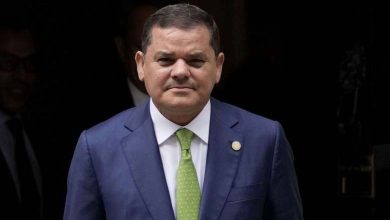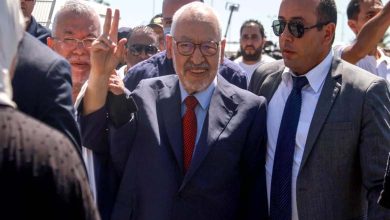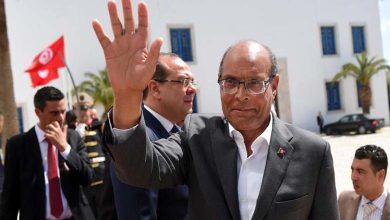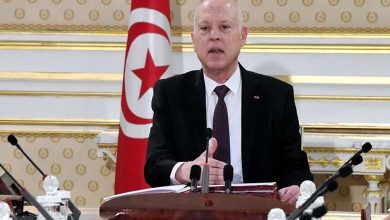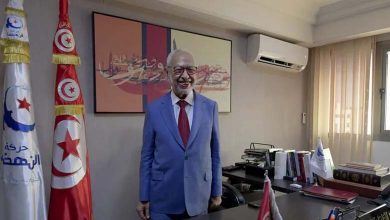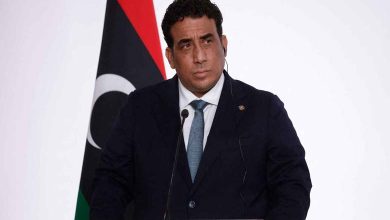Financial Strangulation and Stalled Dialogue with Haftar Threaten Dbeibah’s Government Continuity
A French report sheds light on the intricacies of the conflict between the Central Bank governor and the Prime Minister of Unity, warning of a security slide in Tripoli
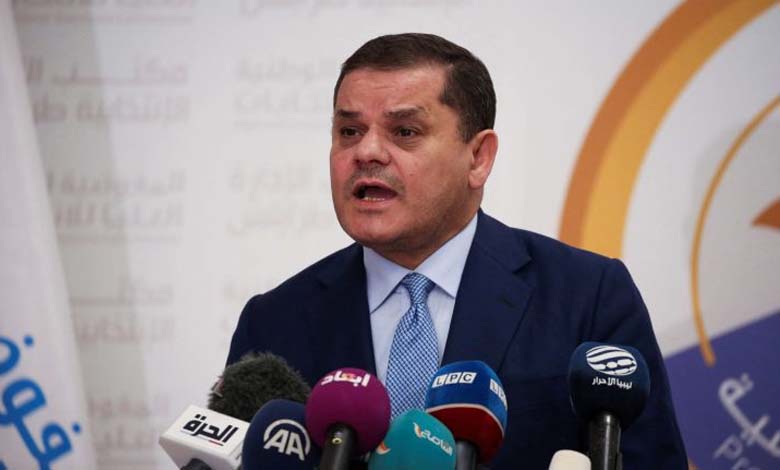
For several weeks now, Libyan Prime Minister of the National Unity government, Abdul Hamid Dbeibah, has been facing policy erosion due to budgetary constraints and stalled dialogue with the commander of the Libyan National Army, Marshal Khalifa Haftar, according to a report by the French newspaper “Le Monde”.
“Le Monde” considers that the firing of two rockets at the Dbeibah family residence in the capital Tripoli at the end of March signals “stormy weather ahead for the government of national unity”, explaining that Dbeibah‘s toughest challenge currently is “the cessation of funding for his government, which has so far enabled him to gain the loyalty of most militias in Tripoli”.
The French newspaper stated that “the governor of the Central Bank of Libya, Saddek Elkaber, refused to release the funds requested by Dbeibah, leading to a fierce clash between the two men”.
It revealed “a violent altercation between Elkaber and Ibrahim Dbeibah, the Prime Minister’s nephew and advisor, which forced the Central Bank governor to spend a month and a half in Turkey out of fear for his safety”.
Amid the recent dispute between Elkaber and Dbeibah, the governor requested the imposition of a 27% tax on foreign currency transactions, a measure aimed at halting the depletion of foreign exchange reserves and the resulting depreciation of the foreign currency, which was responded to by the President of the Parliament, Aguila Saleh, issuing a decree imposing these taxes.
According to “Le Monde”, the situation is becoming increasingly delicate for Abdul Hamid Dbeibah, as the strength of his political base largely depends on spending.
The newspaper quoted a diplomatic source as saying “Dbeibah‘s power is linked to the armed groups he supports, and the financial stranglehold will expose him to an existential crisis”.
In light of these circumstances, the source expressed concern about the possibility of a security slide in Tripoli due to escalating tensions.
The French newspaper also believes that what is tightening the noose around Dbeibah is “the increasingly complex relationship with Marshal Khalifa Haftar. The day after taking office, Dbeibah attempted to establish somewhat peaceful relations with Haftar, breaking with the division that has dominated Libyan political life since 2011.
However, the calm that allowed for the cessation of hostilities in October 2020 was closer to a “pact of interests and corruption”, as formulated by Libyan analysts at the time, rather than a permanent reconciliation”, according to the French report.
The report substantiated this by noting that Haftar was behind the formation of a parallel government called the “Government of National Stability”, based in Benghazi. Since then, negotiations between the two parties on the reunification of powers have failed.
The newspaper quoted a diplomatic source as saying that Marshal Haftar “demands key portfolios”, and it appears that he has recently raised the stakes by supporting Elkaber behind the scenes in a tug-of-war game with Dbeibah. In reality, Elkaber received apparent support from the President of the Parliament, Aguila Saleh.
Despite the mounting difficulties for Dbeibah, few analysts dare to predict an imminent collapse of his government in the absence of an alternative figure in western Libya, according to “Le Monde”, which emphasized that instead of short-term disturbances, Libya risks remaining in the same deadlock due to the increasing influence of two foreign powers, Turkey and Russia”, especially with the recent development of the two countries’ openness to all regions, while Washington no longer hides its “concern”, according to the French report.
While its embassy in Tripoli was closed during the post-2011 chaos, the United States seeks to reopen its diplomatic representation, as evidenced by a budget request of $12.7 million sent by the State Department to Congress on March 11.
The document indicates that “Russia’s increasing influence on NATO’s southern flank is one of the motivations for this return to Libya”, concludes the French newspaper, wondering if there is a new strategic equation in the making in Libya.


